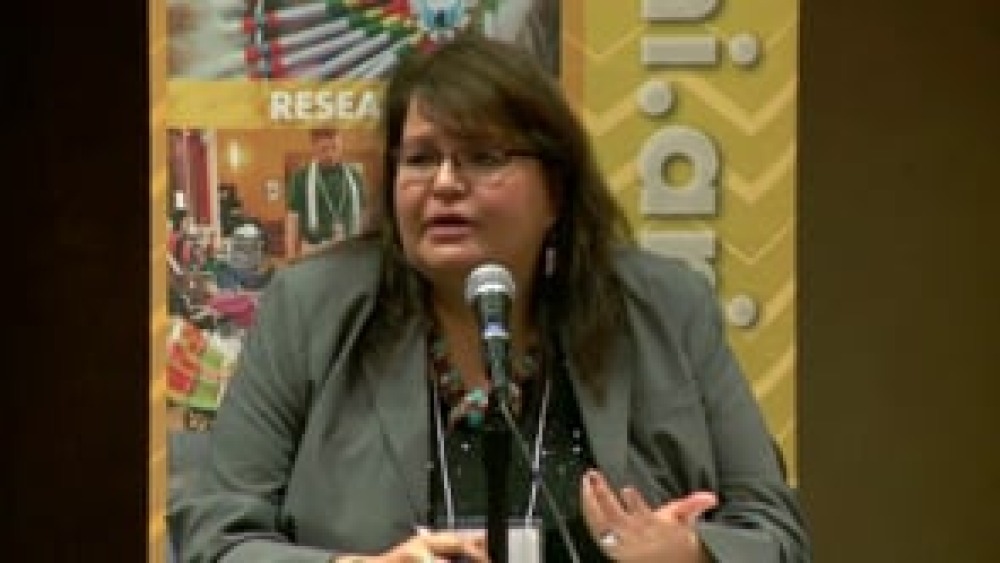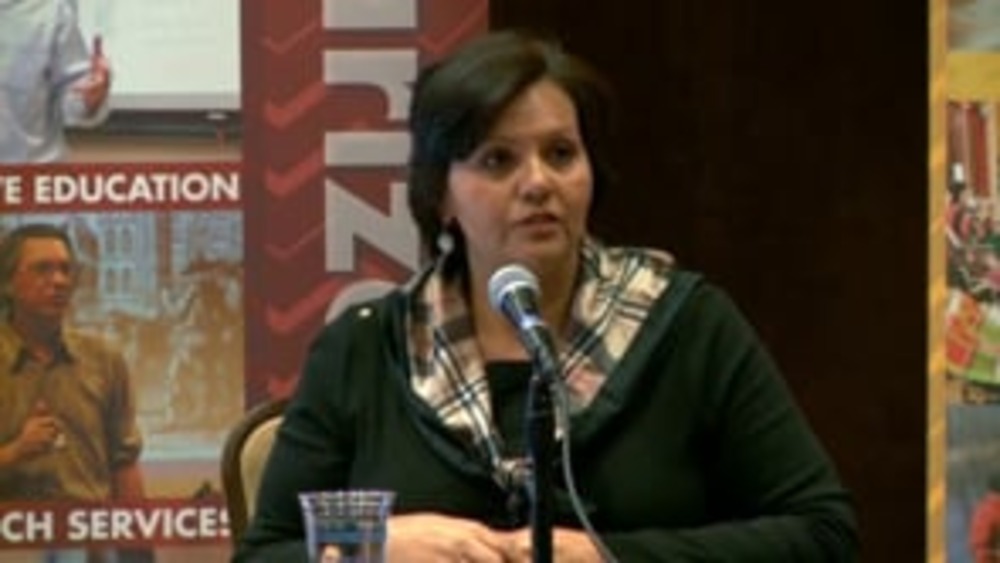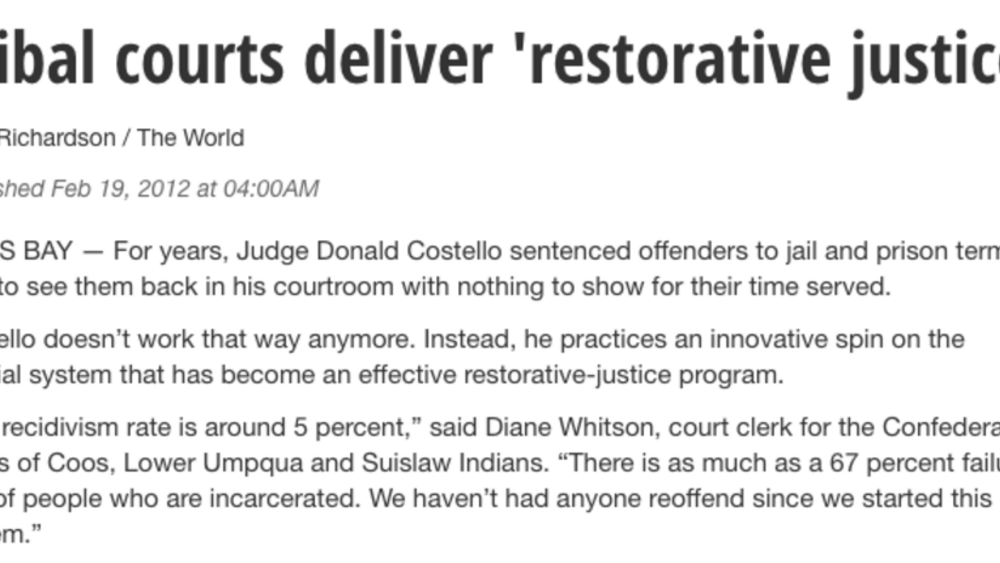In this short session, panelists Eldena Bear Don't Walk and Rae Nell Vaughn delve into further detail about the importance of tribal justice systems receiving adequate funding in order to administer justice effectively. Robert Yazzie, former Chief Justice of the Navajo Nation Supreme Court, also offer his thoughts about the importance of Native nations consulting natural law and their own common law when creating new laws.
Additional Information
Bear Don't Walk, Eldena. "So What's So Important about Tribal Courts? (Q&A)" Emerging Leaders seminar. Native Nations Institute for Leadership, Management, and Policy, University of Arizona. Tucson, Arizona. November 7, 2013. Q&A session.
Vaughn, Rae Nell. "So What's So Important about Tribal Courts? (Q&A)" Emerging Leaders seminar. Native Nations Institute for Leadership, Management, and Policy, University of Arizona. Tucson, Arizona. November 7, 2013. Q&A session.
Transcript
Robert Yazzie:
"May it please the court."
Eldena Bear Don't Walk:
"Justice Yazzie, you may proceed."
Robert Yazzie:
"I miss that -- when attorneys and practitioners approach coming to court and make their case. I really appreciate your presentation and you hit some of the high points why tribal code should be considered very important. I just want to let you know that my experience, the same way that these judges articulated what they had to go through was no different with mine. And I hear a relationship between the Navajo Nation courts and the Navajo Nation Council. We used to always say that Navajo codes is a stepchild, it's always a last priority when it comes to budget. So even then, we fought and fought and we had the same experience. The council delegates would come to me and say, ‘Can you do something with this case?' And I would say, ‘If I do something for you, you and I could be in trouble. And when I put my hand up to say, ‘I will do the best to administer the law under Navajo law,' it means I have to adhere to the ethical considerations and I can't ask the council for favoritism, neither can the council ask for favoritism of me. That's a responsibility that you and I have. And I don't want you to get in trouble and I don't want to be in trouble, that's bad stuff.' So those who have experienced, have gone through...and even meeting with all the judges on a national level, we heard about the attitude. ‘The judges don't know anything and the judges are dumb and stupid. Their laws are unfair.' I think that kind of criticism, well, we took it as a positive note to say that we're going to do better. If the outside don't like it, if the Supreme Court of the United States, say they want to do us in, well, so be it.
I had a chance to see...visit...meet Sandra Day O'Connor when she was an associate justice for the Supreme Court. And from Gallup to Window Rock, she told me, ‘Tell me everything there is to know about peacemaking,' and I did that. And upon our arrival, other prosecutors and some of the Navajo Nation attorneys, we gave what we [could], the best that we have, the best possible information. The last thing she said was, ‘Well, it's fine that you talk about tribal sovereignty, but isn't it about time that you seek help from the state?' That just kind of hit me that what she said was, no matter what we say about tribal court and tribal sovereignty, it really doesn't matter to the outside world. It's like, you think as a judge, they really don't give a damn and sometimes you just to get help, have that human emotional feeling speak to you. But now I'm at the point I say, ‘That's okay, as long as we can say to each other as Indian people, 'We can do it.'' We have a mind, we have ability to plan, we have ability to live. The life element is always a key concern of the elders and I'm sure your elders do the same thing. They always say, ‘Does this legal decision have life in it?' [Navajo language] and you'd like to say to them, ‘Yes, there is life in this decision.' And it's because they like to see resilience, they like to see good results, a real bad situation, no matter how bad it is, I think the judges always have to have a good play in it.
So all I'm saying is that, as I tell my students sometimes...I like to teach law; I like to teach young people, Indians. It doesn't matter who, Indian young people, get them groomed, get them orientated, introduce them and say, ‘This is white man's law, this is our law and there's credibility in this law, there's also credibility in this law.' Some people may say, ‘Well, as for legal issues, this white law has all the answers and your law doesn't.' Don't ever assume that that is the truth. Always think [that] there's always something because Indian people have survived through the worst scenarios, the worst chaos and we're still here. And if we take that attitude and say, ‘Well, there's nothing in terms of tribal law,' if we think that way, then so be it. But if we think, ‘There's no law,' there's going to be a law and that law is going to be ours. It's going to have a reflection upon how we think, our values, how we cherish life and that should be the foundation to our legal system. And I think that's what we're talking about, the tribal court and when we say tribal courts.
And the other thing that I tell my, emphasize with my students is that, ‘What if you wake up today and you found out you have no reservation, no tribal court, no tribal council, no land, then what?' And the reason why I ask the question is that, as Steve [Cornell] pointed out and was saying, you have the expertise as Indian people. And yes, the white people have theirs, but if you don't use yours, there's consequences meaning that if we don't see...if our relationship with the federal government is severed, then we would say, ‘What happened?' Some population in the mainstream who'd like to shut down tribal court, tribal council, shut down the reservation and they want all Indian people to be under one law, state law. So as much as you want to save us, as much as you want this understood you say, ‘Is that what we want?' If not, we've got to do our darnedest to hold on to what we have and we have it, we still have it. They say we don't speak the language. We still do. The wind still blows, the sun still comes up, the fire is still there, the water still runs, they have voices, they know our language and they are good mentors to us. That's what you call natural law as a basis for all Indian law. Thank you."
Ronald Trosper:
"Thank you. We have a question over here now."
Adam Geisler:
"Yes. I'm wondering if you could share a little insight on some of the financial challenges that your courts may face and specifically how those dollars relate to the overall structure of the court and personnel, because I think that's one thing we're finding in Southern California is that when you're giving to smaller tribes we have to form consortiums like inter-tribal court down there. And I'm just wondering if you could talk a little bit about how you sustain yourselves as a court without having your cops out there writing tickets all the time for frivolous things."
Eldena Bear Don't Walk:
"A cop would never write a ticket for something frivolous. So in the different court systems that I work in, the trial courts almost always get their money directly from the tribal general council. So there are ways to make your courts a little bit more sustainable in your fees. In every other court in America, every time you file a motion they charge you $20, maybe they charge you $75 and people say, ‘Oh, we don't want to charge our people.' Everybody's got to participate in the community and sometimes that's like saying, ‘We have to feed all of our people for free. We don't have to give them jobs.' Everybody has to be a part of it and you have to be creative with it, but a lot of tribes are using...they get their money out of the general fund, some of them get it directly from the BIA [Bureau of Indian Affairs], other places get it from grants. And again, the problem you see with grant development is that, yeah, you can develop a great youth court on grant money, but how are you going to make that sustainable in the long term? And a lot of organizations now, for example, the Administration for Native Americans, when they do their program development, you have to explain how you're going to sustain that after the money is gone. So I don't think though...
Montana had an inter-tribal appellate court up into the late ‘80s where there were five or six Indian attorneys or attorneys who practiced Indian law who traveled from tribe to tribe doing their appellate work for them and it was financially very reasonable and accessible for tribes to use instead of trying to fund their own court systems. Washington has a very similar program for all of the little tiny Salish tribes over on the coast. Don't think that you have to have your own system to make it work. If you can work in a consortium, lots of tribes are working in consortiums. Consortiums can build power, they can build opportunity, they at least can give you the access to a tribal court system because that's what you want and then you can expand.
The money for tribal courts is tricky. It really depends on how your tribe is situated: if you want to do contract, if you want to do grant money, if your tribe is willing to just take it out of their general fund. The money for my court specifically comes out of the general fund and fortunately or unfortunately any money that we make -- and that means filing fees, transcription fees -- that isn't paid out goes back into the general fund so we don't keep it. We had a law conference this summer. Any money that we made went back into the general fund; it didn't come back into our account. So we run on a very small budget, the appellate court does. I know that our tribal courts run on limited budgets as well. I think that it is irresponsible to think that you're going to get all of the money you ever need for everything that you want.
And again, people need to learn to be creative. Everything is underfunded. The American government is underfunded, the United Nations is underfunded, your tribal court system is underfunded, your city court is underfunded so you're going to have to figure out how to make it work the best way you possibly can. Unfortunately too, we have not...we have developing jail systems; we just got a new jail. Other places have jails that I know are absolutely condemnable or have been condemned, but they're still using them for detention. Those are things that administrations have to make priorities. Your courtroom itself is not necessarily a reflection of everything, but your system is and it's important to make that outward appearance to people. So your jails, your courtrooms, all of those things reflect what the tribe values in its programs."
Rae Nell Vaughn:
"I can expand a little as well concerning Choctaw structure of financial support from the government. Similar to my co-presenter we, as I stated earlier, at that point when I was operating the court it was a $3.5 million budget, 82 percent of that was tribal revenue. The rest was a combination of grants and other sources, but again it was sustainability. For example, Teen Court launched based on a grant and the tribe saw the success of the court, of the teen court forum and so they chose to go ahead and continue on with that. In regards to collections of filing fees and fines and things of that sort, we were not able to retain that. That ultimately went back into the general fund. The general fund in turn supported our security and our TSA-type support of going into the court. We were able to, under grant funding, to be able to build a new justice complex over seven years ago, I believe, and so we have the good fortune of having a state-of-the-art detention center. We've talked with other tribes about possibly utilizing our detention center to house their inmates who are currently being housed in county lock-up and having them transported down to Choctaw. So again, creatively, being creative into how you can operate your system.



